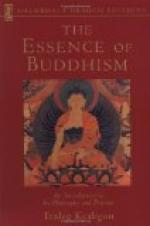Briefly I will tell you the
marks of a friend—
When doing wrong, to warn;
when doing well, to exhort to perseverance;
When in difficulty or danger,
to assist, relieve, and deliver.
Such a man is indeed a true
and illustrious friend.
—Fo-pen-hing-tsih-king.
His friendship is prized by the gentle and the
good.—Fo-sho-hing-tsan-king.
Living ... without cruelty among the cruel.—Udanavarga.
The Scripture said: “Be kind and benevolent to every being, and spread peace in the world.... If it happen that thou see anything to be killed, thy soul shall be moved with pity and compassion. Ah, how watchful should we be over ourselves!”—Sha-mi-lu-i-yao-lio.
I desire to produce in myself a loving heart towards all living creatures.—Fo-pen-hing-tsih-king.
Let us then practice good works, and inspect our thoughts that we do no evil.—Fo-sho-hing-tsan-king.
Now, therefore, it behooves me to examine into my faults; and if I find anything wrong in me, to put it away, and practice virtue only.—Jataka.
Therefore ... we would humble ourselves and repent us of our sins. Oh! that we may have strength to do so aright!—Liturgy of Kwan-yin.
If we know that we have done wrong, and yet refuse to acknowledge it, we are guilty of prevarication.—Chinese Pratimoksha.
From the very first, ... having no wish to benefit others, or to do good in the least degree, we have been adding sin unto sin; and even though our actual crimes have not been so great, yet a wicked heart has ruled us within. Day and night, without interval or hesitation, have we continually contrived how to do wrong.—Liturgy of Kwan-yin.
Accept the confession I make of my sin in its sinfulness, to the end that in future I may restrain myself therefrom.—Cullavagga.
He who offends an offenseless man, ... against such a fool the evil reverts, like fine dust thrown against the wind.—Kokaliya-sutta.
May wisdom be with me always.—Inscription in Temple of Nakhon Vat.
The fool who knows his foolishness is wise at any rate so far. But the fool who thinks himself wise, he is a fool indeed.—Dhammapada.
He who holds back rising anger like a rolling chariot—him I call a real driver: other people are merely holding the reins.—Dhammapada.
Anger, alas! how it changes the comely face! how it destroys the loveliness of beauty!—Fo-sho-hing-tsan-king.
The fool who is angered, and thinks to triumph by the use of abusive language, is always vanquished by him whose words are patient.—Udanavarga.
He who lives far from me yet walks righteously, is ever near me.—Fo-sho-hing-tsan-king.
He sought after the good of those dependent on him.—Questions of King Milinda.
Who, though he be lord over others, is patient with those that are weak.—Udanavarga.




